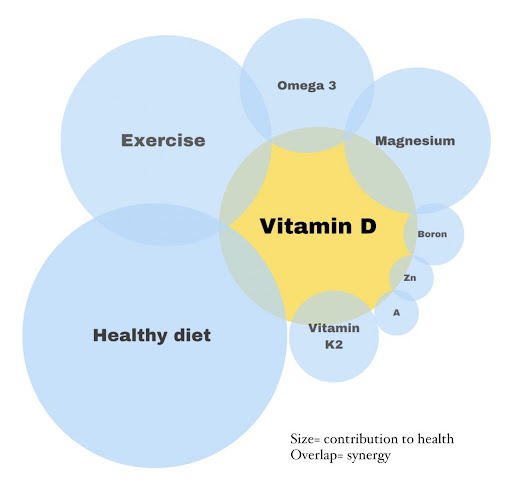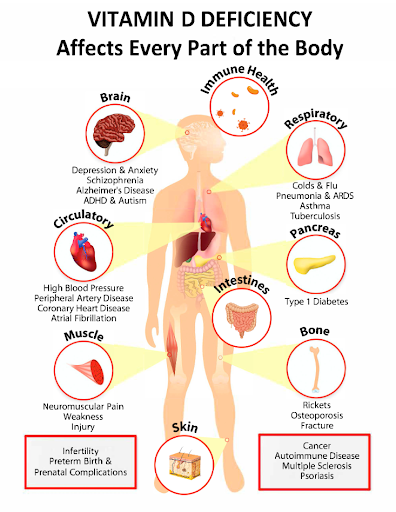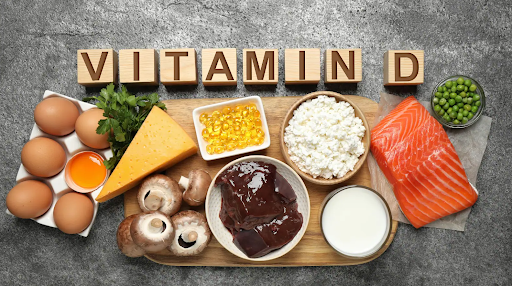This month, we are going to discuss the health benefits of Vitamin D, its cofactors, and how they work together to give us healthier bodies. It’s beneficial for your full understanding to also read some of our previous research articles, especially:
Let’s take a closer look at Vitamin D.
What is vitamin D?
Most people know that vitamin D can be produced through healthy levels of exposure to the sun. This is why doctors often recommend catching some sunlight every day. However, sunlight is not the only way to get vitamin D into our bodies.Vitamin D2 and vitamin D3, the two primary types of vitamin D, can be obtained from a number of foods. They cannot, however, be our exclusive source of vitamin D because we often do not eat enough of these items in our diets. Foods like milk, cereal, and some orange juices are fortified with vitamin D2 and vitamin D3 for this reason.Recent studies have shown that vitamin D is critical for the body and that many of us suffer from vitamin D deficiency without even being aware of it, which has led to an increase in awareness by doctors and medical experts.This nutrient supports many health functions of our bodies including both mental health and physical health. As your skin produces vitamin D when exposed to sunlight, it shouldn’t really be called the “sunshine vitamin” but instead the “sunshine hormone” (which just doesn’t sound that good). Also, it is a nutrient – a fat-soluble vitamin that undergoes absorption along with fat in the diet and is stored in the liver and fatty tissues of the body. The most important function of vitamin D in our bodies is the absorption of calcium and phosphorus, both of which are necessary for bone growth.
Vitamin D Cofactors
It is a chemical compound that is bound to a protein and is essential for its biological function. To function properly, vitamin D needs magnesium, calcium, omega 3, boron, zinc, and vitamins A and K2.Magnesium is one of the most important cofactors and, to put it simply, it’s necessary for vitamin D to bind to its transport proteins and be delivered to the tissues. Magnesium is synergistic to vitamin D3 and increases its benefits up to 30%.K2 is another important component needed to work with vitamin D in the metabolism of calcium, ensuring calcium is deposited in the teeth and bones rather than in the blood vessels. K2 is essential for bone mineralisation.Key food sources of vitamin K2 include fermented dairy products such as cheese, spinach, brussels sprouts, kale, and also beef liver, which contains 11 mg of vitamin K2 per 100g. Many food supplements already combine D3 and K2.

Health Benefits of vitamin D
There are more than 30,000 genes in the human body and vitamin D supports more than 2,000 of them. Since vitamin D insufficiency has been linked to more than 200 diseases, it is crucial to keep levels at their ideal ranges.
Bone Health Maintenance
Vitamin D helps maintain bone strength and health by regulating the absorption of calcium and phosphorus. These minerals also contribute to the density and strength of your teeth and skeletal system.
Supports the Immune System
Vitamin D supports the immune system and helps our body resist infections. Respiratory infections like pneumonia and bronchitis, and other viral infections are often related to vitamin D deficiency. It also stimulates immune cells to recognize and kill cancerous cells.
Reducing Hair Loss
Keratin, a protein found in skin, nails, and hair, is produced by keratinocytes, which are supported by vitamin D. This vitamin is known for its anti-inflammatory and immune-modulating properties, aiding in the reduction of hair loss in both men and womenVitamin D supplementation can help address hair loss related to inflammation, viruses, infections, or post-COVID-19 recovery. Studies also link low blood vitamin D levels with conditions like androgenetic alopecia and alopecia areata, showing success with topical D treatments.
Help in Reducing Stress and Depression
Vitamin D plays a role in mental health by regulating dopamine, which helps prevent stress and depression. Studies show it may reduce symptoms of depression, including postpartum and pregnancy-related depression, bipolar disorder, and seasonal affective disorder.
Mood Enhancer
Vitamin D is crucial for serotonin production in the brain. People with seasonal affective disorder often feel better after sun exposure due to increased vitamin D levels, which also reduce anxiety.
Helps in Reducing Excess Body Weight
Vitamin D and calcium act as appetite suppressants. Research suggests those who take vitamin D during a diet lose more weight than those who don’t.
Control of Insulin Levels
Vitamin D helps regulate insulin production, stimulating the pancreas to release insulin and promoting glucose uptake in cells, which lowers blood sugar levels.
Lowering Blood Pressure
Increasing vitamin D intake can help lower high blood pressure by suppressing renin release from the kidneys, which constricts blood vessels and raises blood pressure.
Prevention of Cancer
Evidence suggests vitamin D may help reduce the risk of breast, colon, ovarian, esophageal, pancreatic, and bladder cancers, as well as prostate cancer progression. Combined with fiber, it can reduce polyp development that leads to rectal cancer.
Supporting a Healthy Heart
A deficiency in vitamin D can affect heart function. Low vitamin D is linked to a higher risk of heart attack. It helps relax the heart, boosts endurance, and prevents abnormal growth and thickening of the heart’s walls, which could otherwise cause atherosclerosis and heart failure.
Maintaining Libido
Low vitamin D can reduce estrogen and testosterone levels in both men and women. As a steroid hormone, vitamin D is vital for libido and erectile function, and it promotes serotonin production, enhancing sexual desire.

Many researchers agree that there is a direct correlation between vitamin D deficiency and autoimmune diseases, low libido and erectile dysfunction, endometriosis, obesity, type 1 diabetes, infertility, premature birth, cardiovascular disorders, allergies, osteoporosis, cancer, diabetes, eczema, psoriasis and many others.People most at risk of vitamin D deficiency include those with limited sun exposure—such as individuals living in northern climates or smoggy cities—and people who spend most of their time indoors, like office workers. Darker skin tones also require more sun exposure to maintain healthy vitamin D levels.As we age, vitamin D production in the body drops significantly—by about four times from age 20 to 70 on average.Overweight individuals tend to have lower vitamin D levels compared to those with a normal Body Mass Index (BMI). Additionally, some genetic conditions impair the body’s ability to produce and metabolize vitamin D.
How to optimise vitamin D level
First, test your blood for serum vitamin D and CRP (C-reactive protein), an indicator of inflammation. It’s recommended to check vitamin D levels annually.Use smartphone apps like D Minder, QSun, or Sunday to track your sunlight exposure based on your age, location, and skin tone.Exercise is essential for effective vitamin D function—it ensures the body uses the vitamin instead of storing it in fat cells.A balanced diet is just as important as physical activity. Popular food sources containing vitamin D include:
- Salmon
- Sardines
- Swordfish
- Cod liver
- Beef liver
- Egg yolk
- Some organically grown mushrooms
- Yoghurt
- Cereals
- Orange juice
Since it would take about nine eggs per day to reach the recommended vitamin D intake from food alone, we cannot rely solely on diet. Supplements and sunlight are still vital.Catch daylight—aim for at least 30 minutes outside between 10:00 and 14:00 when your body is not fully covered by clothes or sunscreen. If outdoor exposure isn’t feasible, consider light therapy.Use sunscreen sparingly—it can reduce vitamin D production by more than 90%. Instead, use clothing and hats for sun protection and stay in the shade during peak sunlight hours.Do not take vitamin D supplements unless recommended by your GP or after testing. If you have chronic or autoimmune conditions, extra supplements could be harmful. Don’t forget the cofactors: Omega 3, K2, and Magnesium. Consult your doctor to determine if you need them.
The role of Vitamin D3 in the prevention of hair loss
Vitamin D3 plays a crucial role in hair health by promoting the production of keratin, the key protein that forms hair structure. It also helps activate hair follicles, keeping them in the growth phase. Adequate levels of D3 reduce stress, a common cause of hair loss.Additionally, D3 supports the absorption of essential minerals like calcium, which is vital for strong, healthy hair. By fostering a nourishing environment for follicles and addressing root causes, vitamin D3 supports the prevention and reduction of hair loss. That’s why we’ve included it in our hair vitamins.
Vitamin D Benefits: Conclusion
We have shown that vitamin D is vital for your bone, muscle and tendon strength, and the health of your blood vessels through its role in calcium absorption. It plays a significant role in cognitive function, mood regulation, and energy levels. It’s also crucial for libido and reproduction, immune system support, and resilience against diseases including cancer.
Maintaining healthy vitamin D levels isn’t just about taking a supplement—it relies on three main pillars: sunlight, physical activity, and nutrients.




